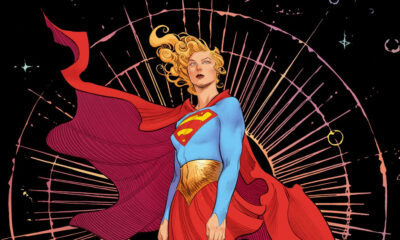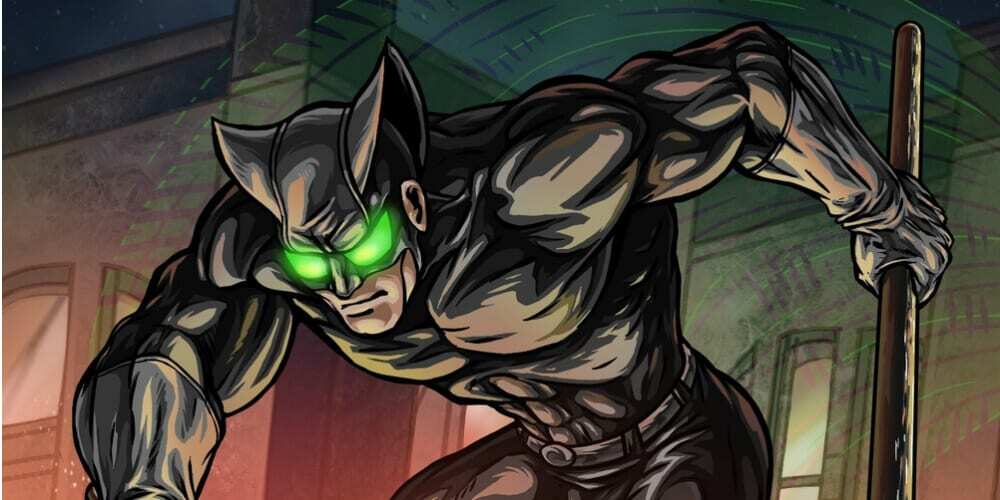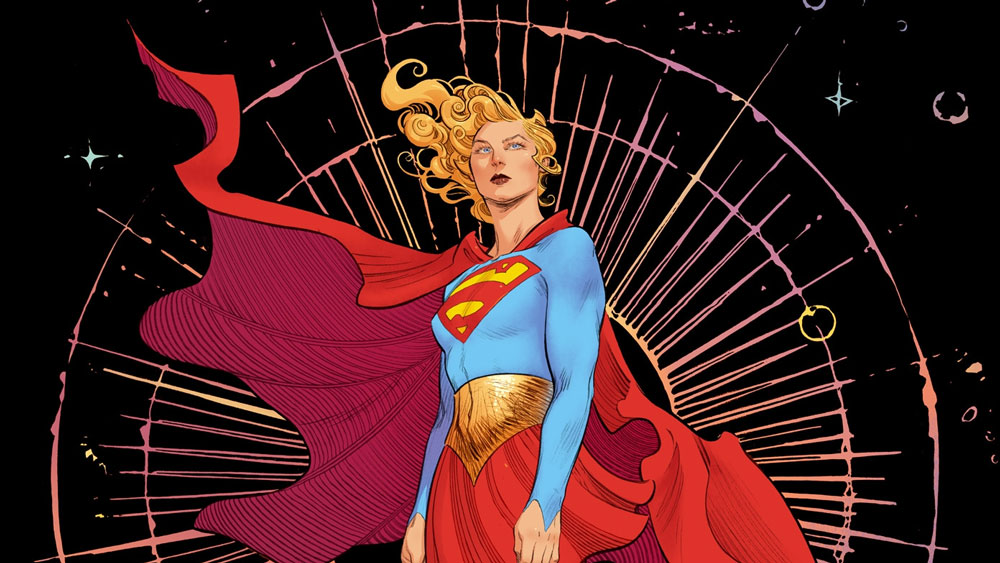DISCLAIMER: This review was sent in for posting back in December, but then the holidays and the press tour happened, and… it got lost in the shuffle. So, before you watch tonight’s return of Supergirl with “Supergirl Lives,” enjoy this recap and refresher from Louis Rabinowitz, who had nothing to do with the delay of this post! Thanks!
Verdict: Supergirl bows out for 2016 with a quiet yet powerful winter finale that places character over spectacle as it brings season two’s numerous themes into a satisfying whole.
Review:
Chances are, Medusa wasn’t the episode you expected. For one, it was promoted as the big kick-off to this week’s huge superhero crossover, so plenty of viewers of Flash, Arrow or Legends of Tomorrow might have expected their favourite characters to play a significant part. And even for Supergirl’s regular viewers, the episode’s status as a big mid-season finale, especially in the light of how bombastic the Arrowverse’s winter finales tend to be, might have indicated a fast-paced episode packed full of revelations and cliffhangers. Medusa is neither of those things, and I think that’s why it works so well – because it opts for a lower-key approach in which character and theme always takes precedence. It’s a thoroughly satisfying capper to this stellar run because it brings almost all of our characters to turning points that speak to the wider themes that the season has been exploring, while offering considerable promise for what will come later.
Medusa is named for the titular virus that Cadmus unleashes, and it proves to be a potent threat for the episode that raises the stakes in a way that feels meaningful, and relevant to the other stories that the episode approaches. For one, it’s a natural conclusion to a run of episodes that’s focused heavily on alien-human relations through a lens of xenophobia and prejudice to feature a threat that serves as a manifestation of the most extreme viewpoint on that issue – turning the insidious prejudice that Supergirl has portrayed this season into brutal, direct action. Supergirl draws on painfully evocative imagery of terrorism here, making Cadmus into a disconcerting and imposing threat for the first time by clearly marking them out for who they really are – supremacists who need the world to reflect their own kind, for whom any diverging way of life, no matter how peaceful, is intolerable and has to be eliminated. The parallels here with real life are the most direct they’ve gotten this season, and it’s clear that’s where Supergirl draws its power from in this regard – by offering a world that reflects our reality, but provides the catharsis and escapism of good-hearted heroes to right those wrongs and offer a more tolerant way forward for everyone.
The nature of Medusa also leads us into the key theme of the episode, which is the notion of parental legacy, and the age-old struggle between the attributes our parents pass down and those we create ourselves. The revelation that Kara’s father created this virus, the ultimate embodiment of division and prejudice that, no matter how ‘well-intentioned’, creates a hierarchy where one species can play god with the lives of another, is a powerful one. It’s not only because it raises the thought-provoking debate as to whether there’s a real difference between the ‘protective’ actions of Kara’s father in safeguarding the Kryptonians and the ‘protective’ actions of Cadmus in creating a world ‘for the humans’ – a question that becomes harder to truly answer despite the initial surface differences – but also because it links neatly into season two’s driving question of just who Kara really is when she’s separated from all who have influenced her. Ultimately, the answer that Medusa seems to arrive at is satisfyingly nuanced – it doesn’t separate Kara from her parents’ actions as would have been easy, yet instead uses the emotions behind those actions, of protectiveness and proactivity, to explain Kara’s own activities as Supergirl. She’s motivated by the same things as her parents, yet she’s channelling them into positive and altruistic action by treating everyone she meets as her equal. There’s more to be explored with Kara’s relationship with her parents – after all, this is only episode 8 of 22 – but it’s a nice place to arrive at for the end of the first run of season two, illustrating how Kara is the product of complicated, sometimes even poisonous influences, yet has the opportunity to channel those influences into something good as both Supergirl and Kara Danvers.
The other side of the coin here is Lena Luthor, who we return to after a few weeks in the margins. Medusa really digs into her difficult, disadvantaged status as the daughter of a family renowned for violence and death, and opens up an intriguingly complicated contrast between mother and daughter that mirrors Kara’s to a surprising extent. The big difference here, though, is that Lena is initially distanced from her family in every way, a sharp contrast from Kara’s status as the beloved daughter of both her Earth and Krypton families. Medusa progresses a long way from the initial starting idea that Lena’s name leads people to assume that she’s duplicitous and cruel by offering the flipside of that: the only family member she can connect to refuses to accept her because she’s not enough of a Luthor.
It’s a great dynamic that powerfully illustrates the near-impossible situation that Lena finds herself trapped in, pushed and pulled between two extremes in which people can never define her as her own woman who is responsible for her own actions. This might be a different take on the racially-tinged prejudice shown by Cadmus, but it’s equally relevant to Medusa’s overall plea for a middle ground to be found where people are respected both for their heritage and acknowledged for their individuality. Cleverly, Medusa takes pains to underline just how far Lena is from that middle ground despite her consistent quest to define herself and her own endeavours, building up to a fake-out turn to evil that actually seems relatively convincing given the circumstances. The fact that Lena’s turn to her mother’s fanatical cause is somewhat justifiable, as it’s framed as Lena’s own choice to take control of her life and define her own goals, ultimately means that the climax of Medusa is all the more suspenseful when she appears to be the one responsible for dispersing Medusa, and all the more rewarding when her innate morality is ultimately revealed. As it turns out, Lena isn’t all that different to Kara – she wants to change the world for the better by genuinely helping people, not in spite of her family’s flaws, but, in a way, because of them, with Lena displaying all the ruthlessness and cunning of a Luthor in her plan to trick her mother. Katie McGrath is doing some really interesting work as Lena, maintaining a guarded, elusive demeanour that makes it extremely hard to put a finger on just what her true nature is – Medusa exploits this for great effect, using our knowledge that Lena’s actions are the only pointer towards her motivations to heighten the suspense in the final act.
Meanwhile, Medusa brings Alex and Maggie’s storyline to a surprising, but satisfying end-point for the year. Alex’s journey of self-realisation in coming out has been one of season two’s brightest spots for many reasons, but it’s noteworthy just how well it’s been constructed, patiently but believably building up Alex’s new image of herself as she comes to accept this ‘new normal’. The last step is coming out to her mother, and it’s a scene that’s just as affecting in its sheer inclusiveness and compassion as her scenes with Kara were a couple of episodes back, with her mother’s proud reaction illustrating how Alex’s journey has ultimately been towards becoming her full self that she’s suppressed all this time, embracing everything that makes her different. From there, it’s Maggie’s turn to make her own leap in realising her feelings towards Alex, with Medusa finding a believable reason for her to re-evaluate her prior opposition to a relationship and realise that she hasn’t accepted herself and her desires in the way that she initially thought. Therefore, the point where Alex and Maggie come together for the first time on an equal footing and start their relationship, it’s clearly the end result of two people moving past their deeply ingrained beliefs and prejudices and simply focusing on what they want for themselves and for each other. In a way, it’s an optimistic take on the struggles that Supergirl has been portraying elsewhere – an ideal scenario where prejudice ceases to hold any power, illustrating its wider significance to the idealistic message the show is spreading as well as underlining the excellent, sensitive writing of a storyline that’s clearly become very important for a lot of people.
Medusa is an episode that’s patient in reaching its pay-offs for the most part, content to make time to add nuance to its stories in order to make the conclusion all the more believable, but that isn’t the case everywhere. The one real mark against this otherwise stellar winter finale is J’onn’s storyline, which is unfortunately a bit sloppy and rushed despite all of last week’s fascinating set-up. His transformation into a White Martian is barely touched upon until the episode’s middle act where it suddenly becomes an urgent problem, and Miss Martian’s absence from the episode given her importance in sparking this change is a little conspicuous because it prevents the episode from focusing on the themes of prejudice that the plotline naturally brings up. It’s undoubtedly a great visual to see J’onn embrace his transformation, using his newfound strength to beat down Cyborg Superman, but his change simply doesn’t carry the weight as it should because the episode is spinning so many plates at once, and just doesn’t have time to create the escalating tension that this story requires. Furthermore, while it’s natural for a lot of problems on superhero shows to be sorted by hand-waving scientific solutions, the significance that the transformation has for J’onn means that the old ‘we suddenly cooked up a cure!’ trick feels like a cheat, an easy way out of a seemingly inescapable situation that is barely foreshadowed beforehand. There’s potential going forward to use J’onn’s experience as a White Martian to explore his widening perspective of the world and close-mindedness in dismissing the whole of the species, but Medusa unfortunately renders this thematically rich storyline as a clunky subplot with a cheap solution.
All in all, this isn’t the winter finale that was indicated by the crossover hype and the intensity of last week’s instalment, but it’s essentially the one that this expansive, thoughtful run of episodes needed. Medusa brings together themes of parenthood, self-realisation and prejudice under one roof, coming to an ultimately compassionate conclusion that reminds us of the idealistic faith in the goodness of humanity that distinguishes Supergirl, especially in a time where its idealism seems to be going against the tide. In a lot of ways, Medusa feels like a finale in its own right, flipping character dynamics on their head with major revelations like Mon-El’s confession and Alex and Maggie’s kiss that offer significant resolution to almost every plotline. It’s not clear, therefore, just what’s coming next for Supergirl when it returns in 2017, and that’s kind of exciting, as there’s such a wide variety of stories to delve into here. We do know, however, what’s coming next for Kara herself, and it rears its head in the very final scene of the episode. The heroes of Earth-1 battling an invasion, and it’s clear that they need an alien of their own to level the playing field…
Odds & Ends
- Mon-El and Kara’s relationship takes a big turn here as Mon-El kisses Kara… and then turns back when Mon-El claims not to remember it. It’s a moment that Supergirl has built to with its careful parallel of the Kryptonite and Daxamite, and the uneasy new situation they find themselves in is an interesting place to go forward from.
- Cyborg Superman continues to be a bit dull – as much as it’s fun to see David Harewood versus David Harewood, he’s essentially just a slightly beefed-up goon with a strange fondness for comparing himself to a superhero with whom he shares absolutely no characteristics.
- Always nice to see Helen Slater back as Kara and Alex’s mother, and she slots in seamlessly into the family and DEO dynamics. After Dean Cain last week, Supergirl sure is making good use of former Superpeople.
- I really hope that The Flash’s episode isn’t 59 minutes of Barry and Cisco attempting to open portals.
- Coming up next: the three-part crossover, where Supergirl meets just about everybody! Will this be (a fun, (b fun, or (c both of the above?
- Supergirl returns in January with the winter premiere, titled Supergirl Lives… directed by none other than Kevin Smith, so you know it’ll be good.


 Superman4 months ago
Superman4 months ago
 Images5 months ago
Images5 months ago
 Images6 months ago
Images6 months ago
 Images5 months ago
Images5 months ago
 Images5 months ago
Images5 months ago
 Images7 months ago
Images7 months ago
 Images6 months ago
Images6 months ago
 Images6 months ago
Images6 months ago




















